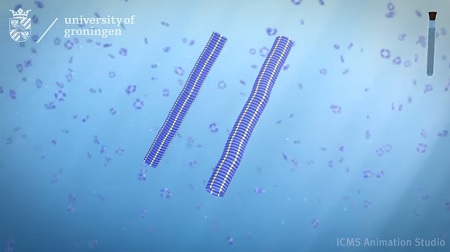Sijbren Otto wins prestigious Royal Society of Chemistry Award
University of Groningen Professor of Systems Chemistry Sijbren Otto is the 2018 recipient of the Royal Society of Chemistry (UK) Supramolecular Chemistry Award. This biennial award is in recognition of Otto’s contribution to the science of molecular networks and systems chemistry. The main theme of his current work is chemical evolution. As recipient of the award, Otto will give a number of lectures in Britain.
‘I feel very honoured to receive this award’, says Otto. ‘It is nice to receive such recognition from my colleagues.’ Each year, the Royal Society of Chemistry presents awards to a number of chemists in a range of fields. ‘Previous winners of the Supramolecular Chemistry Award are leading scientists in the field, so it is great to be on that same list.’ The award, which will be presented later this year, includes a medal, £ 2000and a lecture tour.

Supramolecular chemistry is a field that studies the interactions between molecules. ‘For a long time, chemistry was mainly about making molecules. In supramolecular chemistry, we try to take the next step and make different molecules work together, for example by forming complexes through self-organization.’ By studying such complexes, Otto discovered molecules that catalyze their own formation: small molecular rings stack into strings that grow and multiply by breaking. The result is a kind of chemical evolution, which may resemble the way in which life originated from lifeless matter.
Over the last few years, Otto has seen his evolving molecules take several steps towards real open-ended Darwinian evolution, where new properties can be invented by the system without help from a chemist. ‘We are getting closer and closer to achieving this’, he says.
Supramolecular chemistry is already used in a number of applications, varying from molecular sensors to molecular complexes that remove the muscle relaxant rocuronium bromide, which is used during surgery, from the body of a patient when an operation has finished. ‘But our work on chemical evolution has even more impact. It may answer questions on how life originated.’ It is this work that gave Otto a place on the steering committee of the Dutch Origins Center, which studies questions on the origin of life on our planet and in the Universe.
Among the previous winners of a Royal Society of Chemistry Award are Otto’s colleagues Syuzanna Harutyunyan ( Homogeneous Catalysis Award winner in 2017) and Ben Feringa, who won the Royal Society of Chemistry Centenary Prize in 2017 and three more Royal Society of Chemistry awards, in 2011, 2012 and 2013. All three chemists work at the Stratingh Institute for Chemistry, Faculty of Science and Engineering, University of Groningen. Otto joins an illustrious list of winners of Royal Society of Chemistry awards, 50 of whom, including Ben Feringa, have gone on to win a Nobel Prize for their pioneering work.
More information
More news
-
29 January 2026
Microplastic research - media hype or real danger?
-
27 January 2026
ERC Proof of Concept grant for Maria Loi
